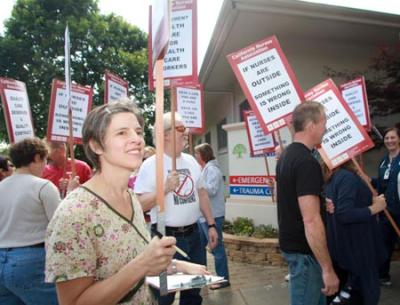News
Federal mediator to work with Enloe, nurses on contract

By LARRY MITCHELL-Staff Writer Chico Enterprise-Record
CHICO — A federal mediator has been appointed to help Enloe Medical Center and the union representing its registered nurses work toward agreement on a new contract.
Bargaining teams for the hospital and the nurses' union had been making progress since negotiations began in November, said Carol Linscheid, who heads the hospital's human-resources department.
But the talks stalled at the last session on April 20, she said.
At the union's request, the Federal Mediation and Conciliation Services appointed a mediator, who will be present at the next bargaining session on May 25 in Chico. Linscheid said she thought mediation could be useful.
Friday afternoon, the union — California Nurses Association/National Nurses United — organized "informational picketing" for several hours in front of Enloe on The Esplanade.
The picketing is "pretty much a standard part of the process," said David Welch, an Enloe nurse and member of the union bargaining team. "We want to let the public know there is a dispute."
Linscheid said the picketing did not mean there was a strike. Nurses were working as usual, she said. The pickets were off-duty nurses and community members.
The contract between Enloe and the union has expired. Negotiators are working on a new three-year contract.
Welch said many issues have been resolved and others seem like they'll be easy to settle. The dispute centers on three issues, he said.
One of these is wages. He said Enloe has offered a 2 percent across-the-board increase in the first year of the contract, and 2 percent in the second. In the third year, the hospital wants to reopen negotiations on whether and how much of a raise nurses should get.
The union is asking for a 3.25 percent increase in each of the three years of the contract.
Linscheid noted Enloe gives nurses an annual 3 percent "step increase." Virtually every RN gets this raise, she said.
Another issue concerns health coverage for nurses who retire before they are eligible for Medicare.
Presently, for some employees, Enloe offers "a bridge to Medicare," Linscheid said. Nurses who are 62 years old and have worked at Enloe for 10 years or more (and those who are 60 with 20 years at the hospital) can "purchase Enloe benefits" if they retire.
Welch said the union is asking the hospital to pay part of the cost of these benefits.
The third issue involves what's called the contract's "management-rights clause," Welch said. It defines which management decisions the hospital can make without consulting the union.
He said the current clause, which has been in place since the union's first contract with Enloe, is "extremely expansive and gives the management the right to make unilateral changes in things that would be normally matters of bargaining."
Examples of the kinds of changes Enloe has been able to make without conferring with the union are "deciding that a department that only worked on weekdays will have to work on weekends, or that a department that hasn't had to be on call should have to take call," he said.
The nurses' union has proposed that the management-rights clause in the contract Enloe has with the SEIU be used in its contract with the hospital, he said.
Linscheid said Enloe's bargaining team likes the clause used in contracts since 2002.
"The language in the SEIU contract is more vague and overly broad. It can lead to confusion," she said. "The 2002 language keeps things very clear."
Sometimes management has to make "tough decisions," and when that's the case, employees are consulted, she said. "Our core values are a big part of how we implement decisions — with sensitivity and respect for our employees. Under CEO Mike Wiltermood, we don't feel any employee abuse has taken place."
###